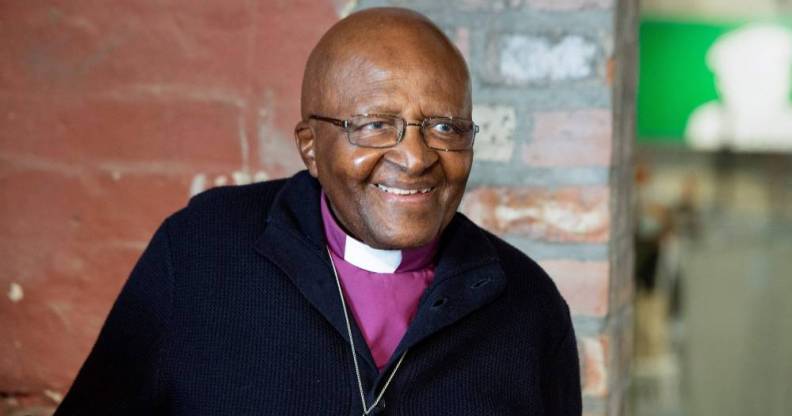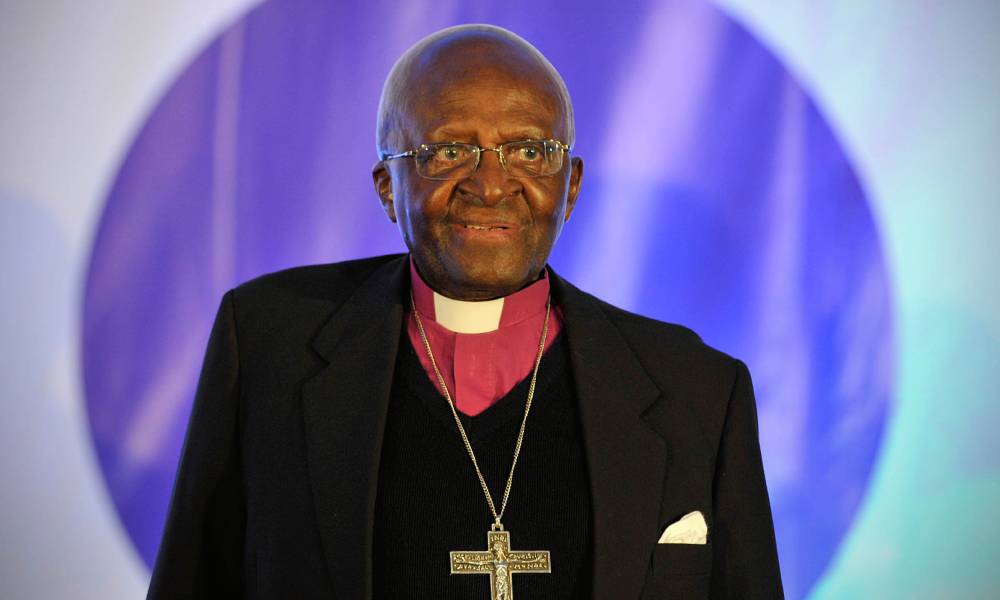Tributes pour in for anti-apartheid leader and LGBT+ ally Archbishop Desmond Tutu

Archbishop Emeritus and Nobel Laureate Desmond Tutu attends an exhibition and book launch of notable photos of his life on 27 April 2019, in Cape Town. (Photo by Rodger Bosch/AFP via Getty)
Tributes are pouring in for Archbishop Desmond Tutu, the activist who was crucial in the fight against apartheid in South Africa, who died aged 90.
Tutu, a Nobel Peace Prize laureate and retired Anglican Archbishop of Cape Town, died on Sunday (26 December), South African president Cyril Ramaphosa announced.
Ramaphosa described Tutu’s passing as “another chapter of bereavement in our nation’s farewell to a generation of outstanding South Africans who have bequeathed us a liberated South Africa”.
“Desmond Tutu was a patriot without equal; a leader of principle and pragmatism who gave meaning to the biblical insight that faith without works is dead,” Ramaphosa said. “We pray that Archbishop Tutu’s soul will rest in peace but that his spirit will stand sentry over the future of our nation.”
Desmond Tutu was a patriot without equal; a leader of principle and pragmatism who gave meaning to the biblical insight that faith without works is dead. We pray that Archbishop Tutu’s soul will rest in peace but that his spirit will stand sentry over the future of our nation. pic.twitter.com/ULGzhOOn9E
— Cyril Ramaphosa ?? (@CyrilRamaphosa) December 26, 2021
Tutu was a leader in the non-violent fight to end apartheid in South Africa and received the Nobel Peace Prize in 1984 for his human rights work.
He was diagnosed with prostate cancer in 1997 and was hospitalised several times in recent years to treat infections associated with his treatment.
Dr Mamphela Ramphele, the acting chairperson of the Archbishop Desmond Tutu IP Trust and coordinator of the office of the archbishop, said in a statement on behalf of the family that Tutu had “died peacefully at the Oasis Frail Care Centre in Cape Town”.
She did not give any further details on the cause of death, the Guardian reported.
Naomi Tutu, the archbishop’s daughter and a race and gender justice activist, shared that her dad is “at rest” before thanking him for “all you have been to our family and the world”.
My dad is at rest. Thank you Tshezi for all you have been to our family and the world. Lala ngo xolo Desmond Mpilo Tutu.— Naomi Tutu (@TutuNaomi) December 26, 2021
Shenilla Mohamed, executive director of Amnesty International South Africa, described Tutu as a “beacon of light” for human rights in South Africa and globally.
She added Tutu’s commitment to equality and rights for all “served as a much needed moral compass during the turbulent apartheid era”.
“Even after South Africa obtained freedom in 1994, the Archbishop continued to be an outspoken, passionate human rights activist,” Mohamed said.
She continued: “He was never afraid to call out human rights violators no matter who they were and his legacy must be honoured by continuing his work to ensure equality for all.”
LGBT+ Rights Ghana, a group advocating for the human rights of queer Ghanians, shared a touching tribute to Tutu on Twitter.
“Thank you for your unwavering support for human rights and principled stand against all forms of oppression,” the group wrote. “You have been an inspirational figure and will be sorely missed.”
Rest In Peace Archbishop #DesmondTutu ????
Thank you for your unwavering support for human rights and principled stand against all forms of oppression. You have been an inspirational figure and will be sorely missed. pic.twitter.com/iiuepo1oie— LGBT+ Rights Ghana (@LGBTRightsGhana) December 26, 2021
Legendary Star Trek actor George Takei wrote on Twitter that a “great leader” has left the world with Tutu’s passing.
“Archbishop and Nobel Peace Prize winner Desmond Tutu helped end apartheid in South Africa,” Takei wrote. “His was a voice of hope, compassion and reconciliation. Let us continue his quest for non-violent transformation.”
A great leader has left us. Archbishop and Nobel Peace Prize winner Desmond Tutu helped end apartheid in South Africa. His was a voice of hope, compassion and reconciliation. Let us continue his quest for non-violent transformation. Rest, wise spirit. We carry your hope forward.— George Takei (@GeorgeTakei) December 26, 2021
British journalist Owen Jones also called on the world to remember Desmond Tutu as the “implacable champion of the opposed” that he was and shared several headlines where Tutu spoke out against discrimination worldwide.
When courageous fighters for justice die, mainstream figures seek to sanitise them and strip them of their radicalism.
So let's remember Desmond Tutu as the implacable champion of the oppressed – and the fervent opponent of tyranny – that he actually was.
RIP. pic.twitter.com/iQXdsKoG8Y
— Owen Jones ?? (@OwenJones84) December 26, 2021
Tutu spent much of his life campaigning for human rights worldwide, especially for LGBT+ rights.
In November, Tutu appeared in a video for the United Nations Free and Equal campaign as part of its “global campaign against homophobia and transphobia”. Tutu declared that he couldn’t “keep quiet when people are penalised for something about which they can do nothing”.
“First, gender. When women are excluded, just simply and solely because they are women,” Tutu said.
He continued: “But more perniciously, more ghastly, is the fact that people are penalised, killed, all sorts of ghastly things happen to them, simply, solely on the basis of their sexual orientation.
“I oppose such injustice with the same passion that I opposed apartheid.”

Archbishop Desmond Tutu during the 5th Annual International Desmond Tutu Peace Lecture on 7 October 2015 at the University of Western Cape. (Getty/Lerato Maduna/Foto24/Gallo Images)
Desmond Tutu also spoke out against homophobic legislation in Uganda.
In 2012, he called on Uganda to scrap its anti-homosexuality bill – which was signed into law in 2014 and was eventually struck down by courts – and described the legislation as “totally unjust”.
“My brothers and sisters, you stood with people who were oppressed because of their skin colour,” he said. “If you are going to be true to the Lord you worship, you are also going to be there for the people who are being oppressed for something they can do nothing about: their sexual orientation.”
He also declared in 2013 that he would never worship a “homophobic God” and would turn “refuse to go to a homophobic heaven”.
Tutu told attendees at the launch of the Free and Equal campaign in Cape Town that he was as “passionate” about the fight for LGBT+ rights “as I ever was about apartheid”.
“I would refuse to go to a homophobic heaven,” Tutu said. “No, I would say sorry, I mean I would much rather go to the other place.”
He added: “I would not worship a God who is homophobic and that is how deeply I feel about this.”

